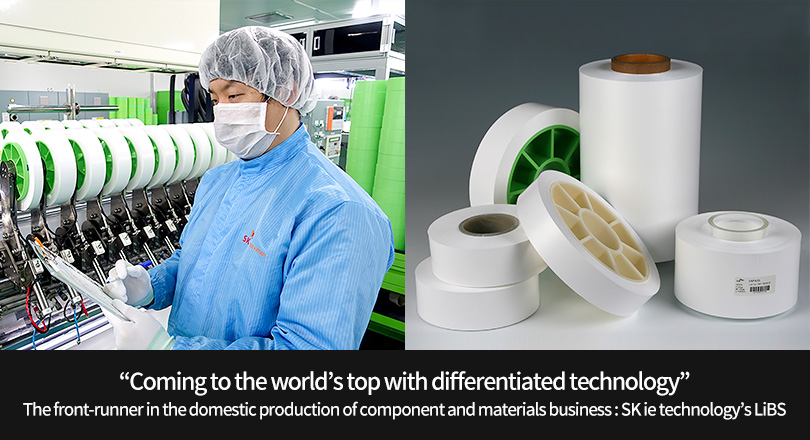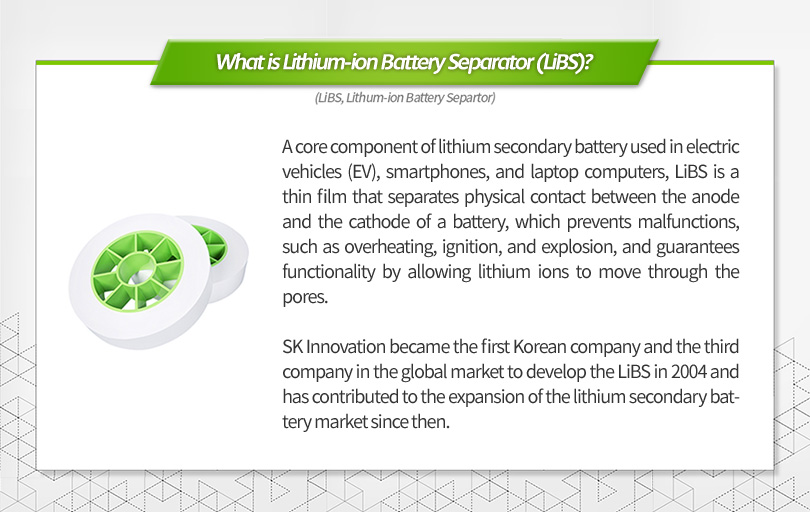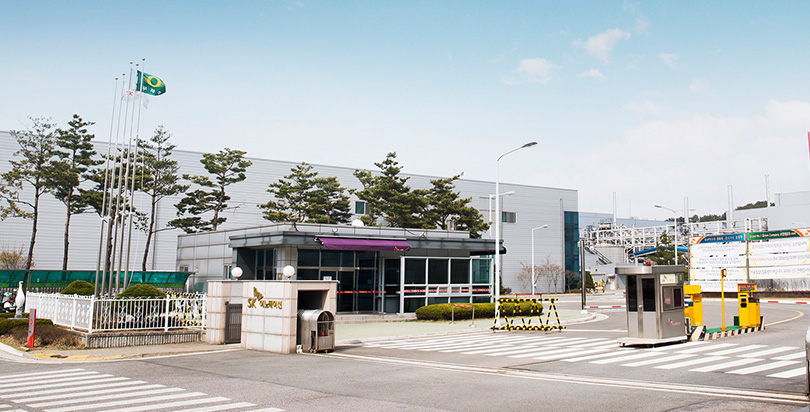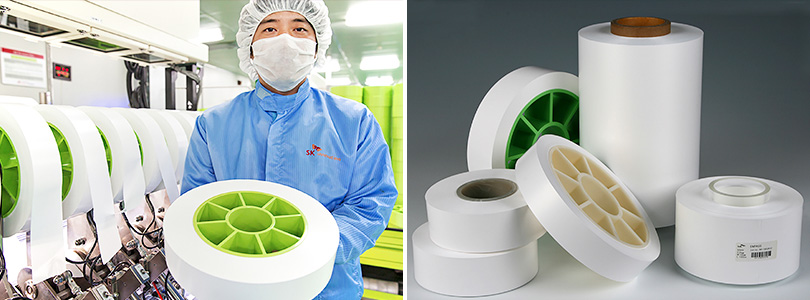SK이노베이션 울산Complex, 매체예술 조형물 ‘매직스피어’ 점등
2025.01.01
 SK이노베이션
SK이노베이션
Magazine SK, the company newsletter of SK Group, has recently published the article, “SK’s Technological Independence achieved in the World market” which discussed the leading technologies currently in possession of SK affiliates.
Among the many technologies of affiliated companies brought by SK Group’s Deep Change strategy, SK ie technology(SKIET), a material business subsidiary of SK Innovation, was the technology’s LiBS(Lithium-ion Battery Separator) for the first time.
We bring you amazing technological expertise and competence of SKIET’s LiBS, a core component of the secondary battery used in electric vehicles (EV), smartphones, and laptop computers
| What is LiBS, the front-runner of SK Group’s independent technology?
LiBS, which stands for Lithium-ion Battery Separator, is a component used in many batteries of devices, such as EVs and smartphones, and sits between the anode and cathode, maintaining its functionality and stability against malfunctions, including explosions or overheating. The component itself takes the form of a thin polymer film that is micrometers in thickness and is divided into dry and wet types. Wet separators tend to cost slightly higher than dry separators in production but have greater shares in the world market (more than 70%) thanks to its superior quality and durability.

SK Innovation developed LiBS for the first time in Korea and third in the world in 2004 by leveraging its competitiveness in the refinery and petrochemical businesses.
Recognized across the globe for its excellence in all areas including homogeneity, contractibility, and stability, SK Innovation has stepped up its investment efforts and carved out the second largest market share in the global LiBS market since 2014. For greater growth in the material business, which includes the LiBS market, SK Innovation has created a subsidiary company called SKIET in April last year. (The producer of LiBS hereafter shall be referred to as SKIET.)
In the analytical report for the “Battery and Component Industry Overview for Corporate Investors of Korea” published last May, researcher Cho Hyun-ryul of Samsung Securities stated that “SKIET is expected to expand its global market share from the second largest in the world (15% market share) in 2017 to the largest (30%) by the year 2025,” and “SKIET’s operating profit is expected to grow by 9.2 times the 2018 levels by the year 2025 (KRW 87 billion to KRW 800 billion).”
| SKIET’s differentiated technology that cannot be imitated
Positive predictions for growth in SKIET’s LiBS business is driven by the differentiated technological expertise of the company. SKIET developed the “sequential stretching process” in 2007 first time in the world that allowed the consistent quality production of extremely thin separators.

CEO Rho Jae-sok of SKIET has said that the technology is their “strategy of distinction” in battery separators, so to speak, as it allows us to produce high-quality separators that cannot be imitated by others,” and they “plan to develop and supply a wide range of separators that can accommodate different kinds of consumer needs.” SKIET plans to use its distinguished technological expertise to develop and lead the battery separator market in a bid to become the “master of battery separators,” whose products are sought after by companies around the world.
| LiBS production sites across the globe
The global EV battery market is expected to develop with an average annual growth of 30% for the next 10 years. This means that the demand for LiBS, the core component of batteries, will grow exponentially as well.
SKIET has increased its LiBS production capacity preemptively to respond to these market changes. Starting with the first Cheongju plant in 2005, the company has started the operation of the 12th and 13th production lines at the Jeungpyeong plant by 4Q 2019. These lines are capable of producing more than 40% of the conventional output of existing production lines.

▲ SKIET’s Jeungpyeong Plant
The operation of the 12th and 13th production lines have boosted SKIET’s production capability from 360 million m2 to 530 million m2 per year. Faster production means that more separators can be manufactured in a given time, which not only makes the production process more efficient but also allows the company to operate the factory flexibly depending on the demand.

▲ LiBS products from SK IE Technology
Other plants are also being constructed around the world. One of these is the Changzhou plant, first overseas plant, occupying an area of 340 million m2 in Changzhou, China, which is one of the largest electric vehicle battery markets in the world.
Another plant measuring 340 million m2 has also been undergoing construction in Silesia, Poland, since last October to provide better outreach to global customers. Altogether, these plants will boost the global production of the company to 1.2 billion m2.
CEO Roh said “The reason we build these production bases abroad, such as Asia and Europe, is to proactively respond to increasing global demand by creating a system capable of securing sufficient production capacity and supplying it in a timely manner.” He further emphasized that “the company will dedicate our entire capabilities in making sure that the plants can be constructed and activated within the planned timeframe, and build upon this production system to expand our production capacity as we prepare our leap toward the global leadership of the market.”
“We also plan to expand our product portfolio, acquire new orders for the global EV battery market, and expand our market share in the IT device market concurrently,” CEO Roh added.
These movements have resulted in market observers predicting a rapid increase in the corporate value of SKIET. Researcher Lee Dong-wook of Kiwoom Securities remarked last June that “the value of SKIET’s separator business is, even from a conservative estimate, expected to reach KRW 6 trillion levels by 2021, and this must be reflected in the total market value.” Lee also emphasized that “considering the tight supply of tier 1 separator market, SKIETs operating profit in the separator business is expected to exceed KRW 300 billion by the year 2021, and applying other elements like the valuation of the separator business competitors and battery component companies and the facility expansion plan, SKIET’s separator business is, even from a conservative estimate, expected to reach KRW 6 trillion.”
| Interesting behind-the-scene stories in LiBS, Q&A
Q. LiBS is brother and sister of trash bags?
Yes!
Both LiBS and trash bags are made with polyethylene (PE), a nontoxic plastic material used for single-use items, bottles, packaging, and electric insulators. Hence, LiBS and trash bags have the same parents, and trash bags, bread packages, and chips bags are all siblings with LiBS!
How did this family come to be?
The answer is, it all came from the researchers of SK Innovation who developed LiBS. Back when the company formed its first LiBS development task force (TF), it was mostly made out of researchers who were already working with PE. Members of the TF even said the fact that they used the same materials gave them a certain sense of “comfort.”, despite their lack of experience with LiBS. Continuous effort at research, which sometimes involved disassembling cellphones and laptops, allowed the team to develop a global top-tier level LiBS. Trash bags, bread packages, and chips bags are all essential parts of our lives, but LiBS is different as it plays on the bigger global stage. It must certainly be a proud child of its parents !
Q. Did the company rebound from cold reception?
Yes!
The LiBS had been developed with much effort and sweat, and now, it’s the centerpiece of a new overseas presentation! Back then, the company had just completed the development, so it had almost no draw to its name. Nevertheless, the developers walked into the presentation with pride and confidence for its quality. However, reception from the participants, representatives of a well-known electronic company in Japan, was frosty. They arrived 30 min late to the meeting, half-heartedly listened to the presentation, threw a few snide questions, and went on their way. It was a cold reception as any.
That, however, led to the members of the team vowing that “we will make them use our products, no matter what.” They rebounded and continued to build trust for their technology and quality and saw the company return for the product eventually. Since then, the company has continued to work hard with its development and is now a partner company sought globally.
Q. Did the company increase its production lines during the 2008 Global recession?
Yes!
The year 2008 saw a financial crisis of global proportions. Back then, as the world economy ran aground from the crisis, nobody had the idea of even mentioning the word “investment.” However, the LiBS team leader back then was convinced of the potential of the business and took up the matter with the group’s highest management when they visited Daejeon’s Institute of Technology Innovation at the end of the year.
Seeing this brash action, the management added another production line to the plan, thus creating two new production lines,* which, in turn, led to the company becoming a global top-level LiBS production company. This bold decision for investment, even amid a difficult situation, was only made possible because of the company’s faith in the potential of the LiBS. It is still cited even today as an example of a prescient and sharp decision for investment.
(*) Thanks to that decision, production lines 4 and 5 were opened in Jeungpyeong Plant in July 2010.
SKIET’s LiBS has climbed to the top with independent, self-made technological expertise! We continue to root for the amazing feats of SKIET in the global market and its doubtless success as the front-runner of domestic adoption in the component industry.